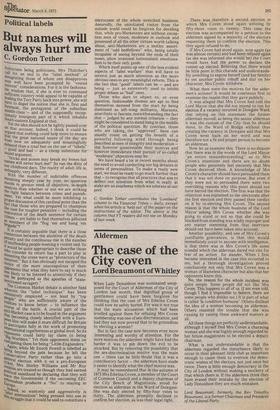Aldermen
The case of the City coven
Lord Beaumont of Whitley
When Lady Donaldson was nominated unopposed for the Court of Aldermen of the City of London last month, that dignified group of gentlemen could have been forgiven for thinking that the case of Mrs Edwina Coven could now be safely buried. For was it not true that the main accusation which had been levelled against them for refusing Mrs Coven membership was one of sex-discrimination, and had they not now proved that to be groundless by electing a woman?
But in fact the case now becomes even more interesting and worthy, of attention. For the more motives the aldermen might have had the harder it was to pin down the evil to be attacked. But by removing the possibility that the sex-discrimination motive was the main one — there can be little 'doubt that it was a contributory factor — the aldermen have made it easier to identify what the chief motive was.
It may be remembered that ih the autumn of 1973 Mrs Edwina Coven, a member of the Court of Common Council and a deputy chairman of the City Bench of Magistrates, stood for election as alderman in the Ward of Dowgate. She was duly elected by fifty-four votes to thirty. The aldermen promptly declined to confirm her election, as was their legal right. There was therefore a second election in which Mrs Coven stood again winning by fifty-three votes to twenty. This time the election was accompanied by a petition to the aldermen signed by a majority of the electors requesting them to confirm the election. This they again refused to do.
If Mrs Coven had stood again, won again (as was almost certain) and had been refused again (as she was informed she would be) the Court would have had the power CO declare the runner-up elected. Believing that there would be little point in this charade and understandably unwilling to expose herself (and her family) to yet another public rebuff and slur on her character, Mrs Coven withdrew.
What then were the motives for the aldermen's actions? It would be courteous first to examine the reasOn that they gave publicly.
It was alleged that Mrs Coven had told the Lord Mayor that she did not intend to run for election if a vacancy occurred in Dow_gate Ward, that relying on this statement the former alderman moved, as being the senior alderman it was the custom of the City that he should move, to the Ward of Bridge without thus creating the vacancy in Dowgate and that Mrs Coven went back on her word and was therefore not a fit and proper person to become an alderman.
Now let us examine this. There is no dispute that there was in the words of the Lord Mayor "an entire misunderstanding" as to Mrs Coven's intentions and there are no doubt people who genuinely feel sincerely that Mrs Coven deceived them. A knowledge of Mrs Coven's character should have persuaded them that it was not done on purpose. But even if they were not so persuaded there were two overriding reasons why this point should not have barred the election. The first was that the objection was explained to the electorate after the first election and they passed their verdict on it by re-electing Mrs Coven. The second reason is that the whole business of the Lord Mayor asking Mrs Coven whether she was going to stand or not so that she could be blocked from standing was wildly improper and any matter stemming from that interview should not have been taken into account.
Another possibility, and one of Mrs Coven's justifiable grievances, is that this would immediately occur to anyone with intelligence, is that there was in Mrs Coven's life some scandal which the alderman dared not cite for fear of an action for slander. When I first became interested in the case this occurred to me, but a thorough investigation proved conclusively not only that Mrs Coven was a woman of blameless character but also that her opponents knew this.
No, the reason for the whole incident was quite simple. Some people did not like Mrs Coven. This happens to all of us. (I am even told, though I find it impossible to believe, there are some people who dislike me.) It is part of what is called 'la condition humaine'. Others disliked the idea of a woman becoming an alderman. Others resented the trouble that she was causing by raising these awkward matters at all.
All these things are perfectly understandable, although I myself find Mrs Coven a charming woman and she was highly enough regarded by her fellow-magistrates to be elected a deputy chairman.
What is not understandable is that the aldermen regarded the disturbance likely to occur in their pleasant little club as important enough to cause them to overrule the democratic wishes of the electors, not just once but twice. There is little enough democracy in the City of London without making a mockery of that which there is. If the aldermen think they have erased their mistake by the election of I.ady Donaldson they are much mistaken.
Lord Beaumont, formerly the Rev Timothy Beaumont, is a former Chairman and President of the Liberal Party










































 Previous page
Previous page